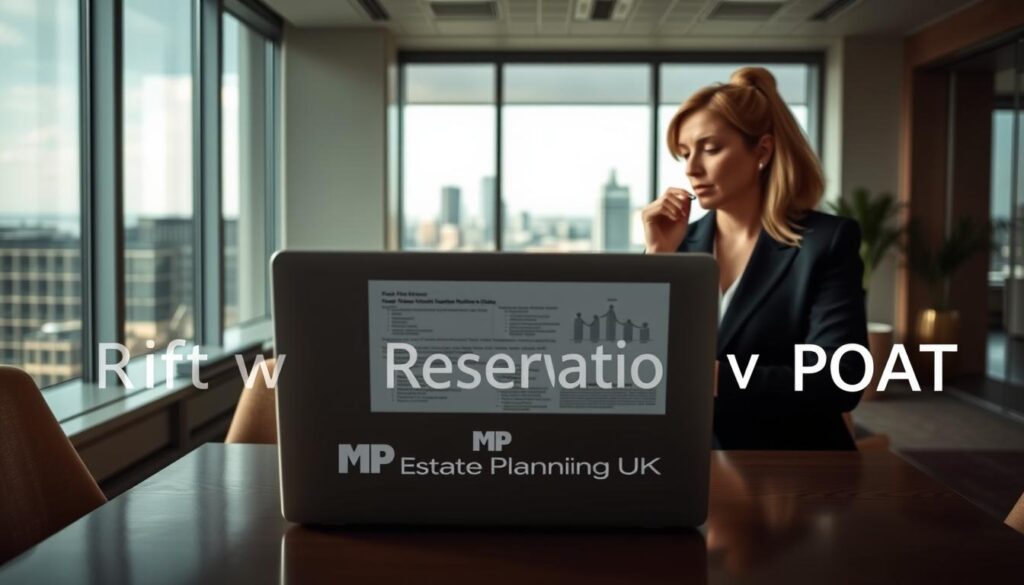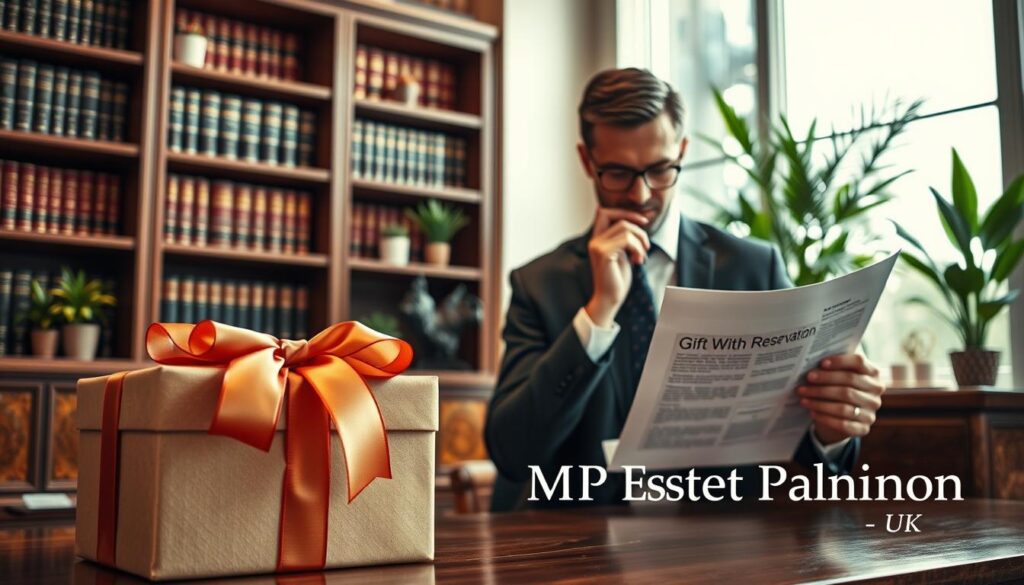Thousands of individuals in the UK unknowingly fall into a tax trap each year due to a lack of understanding about the differences between Gift with Reservation and Pre-Owned Asset Tax (POAT). This misunderstanding can lead to unexpected inheritance tax liabilities, potentially jeopardising their financial planning and family’s future.
We have seen many cases where individuals make gifts without realising the implications on their tax obligations. It is crucial to grasp the nuances between these two concepts to avoid such pitfalls. By understanding the rules surrounding Gift with Reservation and POAT UK, individuals can better navigate the complexities of inheritance tax and ensure their estate planning is effective.
Key Takeaways
- Understanding the difference between Gift with Reservation and POAT is crucial for effective estate planning.
- Incorrect assumptions about gifts can lead to unexpected inheritance tax liabilities.
- Pre-Owned Asset Tax (POAT) can apply to certain gifts, affecting tax obligations.
- Seeking professional advice can help mitigate potential tax traps.
- Proper planning can ensure compliance with UK inheritance tax regulations.
Understanding Gift With Reservation in the UK
Gift with Reservation occurs when an individual gives away an asset but continues to benefit from it, a situation that can have significant tax implications. According to HMRC, such gifts can be treated as part of the donor’s estate for tax purposes, potentially leading to unforeseen liabilities.
Definition and Key Features
A Gift with Reservation involves two key elements: the gift itself and the reservation of benefit. The donor must have made a gift, and they must have reserved some benefit from that gift. For instance, if someone gifts their home but continues to live there without paying market rent, this could be considered a Gift with Reservation.
Key features to consider:
- The gift must be of a type that can be subject to reservation.
- The donor must have reserved a benefit, either directly or indirectly.
- The reservation must be significant and not merely incidental.
As noted by HMRC, “A gift is made with reservation if the donor or their spouse/partner retains some benefit from the gift.” This can include using the gifted property or receiving income from it.
Tax Implications
The tax implications of Gift with Reservation can be substantial. Such gifts are generally treated as part of the donor’s estate for Inheritance Tax (IHT) purposes. This means that the gift could be subject to IHT, potentially increasing the tax liability upon the donor’s death.
Tax implications include:
- Inheritance Tax: Gifts with Reservation are typically included in the donor’s estate for IHT calculations.
- Capital Gains Tax: Depending on the circumstances, CGT may also apply.
It’s crucial to understand these implications to avoid unexpected tax burdens. As stated in a recent tax review, “The rules surrounding Gift with Reservation are complex and require careful consideration to navigate effectively.”
Common Misconceptions
One common misconception is that gifting an asset automatically removes it from the donor’s estate for tax purposes. However, if there’s a reservation of benefit, this may not be the case. Another misconception is that only direct benefits are considered; indirect benefits can also trigger Gift with Reservation rules.
“Many believe that gifting assets is a straightforward way to reduce their estate’s tax liability. However, the reality is more complex, especially when it comes to Gift with Reservation.”
Understanding these nuances is vital for effective estate planning. By clarifying the definition, key features, tax implications, and common misconceptions surrounding Gift with Reservation, individuals can make more informed decisions about their estate.
What is POAT (Potentially Exempt Transfer)?
In the realm of UK estate planning, POAT stands out as a vital concept. POAT, or Potentially Exempt Transfer, is a mechanism that allows individuals to make lifetime gifts without necessarily incurring inheritance tax liabilities immediately.
Definition and Process
POAT refers to gifts made by an individual during their lifetime that are potentially exempt from inheritance tax, provided the donor survives for at least seven years after making the gift. The process involves transferring assets to beneficiaries, which can include family members or trusts.
It’s essential to understand that if the donor dies within seven years, the gift may be subject to inheritance tax, depending on the donor’s total estate value at the time of death and the availability of any unused nil-rate band.

Advantages of POAT
Utilizing POAT can offer several advantages in estate planning, including reducing the overall value of the estate subject to inheritance tax and providing financial support to beneficiaries during the donor’s lifetime.
- Reduces inheritance tax liability
- Provides financial support to beneficiaries
- Allows for the transfer of assets during the donor’s lifetime
Eligibility Criteria
To qualify for POAT, gifts must be made outright to individuals or into certain trusts. The donor must not retain any benefit from the gift, although there are exceptions for certain types of gifts, such as those made into accumulation and maintenance trusts or disabled trusts.
| Criteria | Description |
|---|---|
| Gift Type | Outright gifts to individuals or certain trusts |
| Donor’s Benefit | No benefit retained by the donor (with exceptions) |
| Survival Period | Donor must survive for at least 7 years |
For more detailed information on lifetime gifts and their implications, you can visit Murray Beith’s guide on lifetime gifts or MP Estate Planning’s article on inheritance tax-free.
The Importance of Timely Estate Planning
As we navigate the complexities of inheritance tax, it’s essential to understand the importance of timely estate planning. Estate planning is a critical process that ensures your assets are distributed according to your wishes, while also minimizing tax liabilities for your beneficiaries.

Risks of Delayed Planning
Delaying estate planning can have significant consequences, including increased tax liabilities and potential disputes among family members. By putting off estate planning, you risk leaving your loved ones with a complex and costly situation to resolve.
Some of the key risks associated with delayed planning include:
- Increased inheritance tax liabilities
- Potential for family disputes over asset distribution
- Lack of clarity regarding your wishes, leading to potential misinterpretation
Role of Gift with Reservation and POAT
Gift with Reservation and Potentially Exempt Transfers (POAT) are two estate planning strategies that can help mitigate inheritance tax liabilities. Gift with Reservation allows you to give away assets while still benefiting from them, whereas POAT enables you to make gifts that are potentially exempt from inheritance tax.
Understanding the role of these strategies is crucial in developing an effective tax planning strategy. By leveraging Gift with Reservation and POAT, you can reduce the value of your estate, thereby minimizing the amount of inheritance tax payable.
Legal Considerations
When it comes to estate planning, there are several legal considerations to keep in mind. It’s essential to ensure that your estate planning strategies comply with current tax laws and regulations.
Some key legal considerations include:
- Ensuring that gifts are properly documented and recorded
- Understanding the implications of tax law changes on your estate plan
- Seeking professional advice to ensure compliance with relevant regulations
By taking a proactive and informed approach to estate planning, you can ensure that your assets are protected and distributed according to your wishes, while minimizing tax liabilities for your beneficiaries.
Comparing Gift with Reservation and POAT
The world of estate planning is complex, and the distinction between Gift with Reservation and POAT is a critical one for UK homeowners. As we navigate the intricacies of these two concepts, it becomes clear that understanding their differences is key to making informed decisions about one’s estate.
Key Differences
Gift with Reservation and POAT are both used in the context of gifting assets, but they have distinct characteristics. Gift with Reservation refers to a situation where the donor continues to benefit from the gifted asset, potentially leading to adverse tax implications. On the other hand, POAT, or Potentially Exempt Transfer, is a gift that is initially considered taxable but may become exempt if the donor survives for seven years after making the gift.
One of the primary differences between the two is the level of control and benefit the donor retains. With Gift with Reservation, the donor continues to enjoy the gifted property, which can lead to it being considered part of their estate for tax purposes. In contrast, POAT involves the donor relinquishing control, with the gift being considered outside of their estate if they survive the requisite period.

Situations for Each Option
The choice between Gift with Reservation and POAT largely depends on the individual’s circumstances and goals. For instance, Gift with Reservation might be suitable for someone who wishes to gift their property but continue living in it. However, this comes with significant tax risks, as highlighted by the HMRC’s guidelines on the matter.
POAT, on the other hand, is often utilized by those looking to reduce their estate’s value for inheritance tax purposes. It’s a strategy that requires careful planning, as the donor must be prepared to relinquish control of the gifted assets.
“The key to successfully utilizing POAT is understanding the risks and rewards associated with gifting assets and being prepared for the potential tax implications.”
Financial Impact
The financial impact of choosing between Gift with Reservation and POAT can be significant. With Gift with Reservation, the potential for tax liabilities remains if the gift is considered part of the donor’s estate. Conversely, POAT offers the possibility of exempting the gift from inheritance tax if the donor survives for seven years.
- Gift with Reservation: Potential for continued tax liabilities due to the donor’s ongoing benefit from the gift.
- POAT: Potential exemption from inheritance tax if the donor survives seven years, but with initial tax implications.
Ultimately, the decision between Gift with Reservation and POAT should be made with professional guidance, taking into account the individual’s financial situation, goals, and the current tax landscape.
Consequences of Misunderstanding Tax Rules
Misunderstanding tax rules surrounding Gift with Reservation and POAT can lead to severe financial consequences. The complexity of these rules often results in costly mistakes, even for those who are well-intentioned.
Common Mistakes
One of the most common mistakes is failing to properly understand the implications of reserving a benefit when gifting an asset. For instance, if an individual gifts their home but continues to live there without paying market rent, HMRC may consider this a Gift with Reservation, potentially subjecting the property to inheritance tax upon the donor’s death.
Another mistake is not keeping accurate records of gifts and their associated reservations of benefit. This can lead to difficulties when trying to prove compliance with tax regulations, potentially resulting in penalties.
Penalties and Liabilities
The penalties for non-compliance with tax rules related to Gift with Reservation and POAT can be significant. HMRC can impose fines and interest on unpaid tax, which can quickly add up. For example, if HMRC determines that a gift was made with reservation of benefit but was not reported correctly, the donor may be liable for the tax on the gift, plus interest and penalties.
To illustrate the potential liabilities, consider the following table:
| Scenario | Tax Liability | Penalty | Total Liability |
|---|---|---|---|
| Gift with Reservation not reported | £10,000 | £2,000 | £12,000 |
| Incorrect POAT reporting | £5,000 | £1,000 | £6,000 |
| Failure to pay inheritance tax | £20,000 | £4,000 | £24,000 |
Real-life Examples
A real-life example of the consequences of misunderstanding tax rules can be seen in the case of a couple who gifted their property to their children but continued to live there rent-free. Upon their passing, HMRC considered the property a Gift with Reservation and subject to inheritance tax. The children were required to pay a significant tax bill, reducing their inheritance. For more information on Gift with Reservation, you can visit our detailed guide on Gift with Reservation of Benefit.

Understanding the tax implications of Gift with Reservation and POAT is crucial for effective estate planning. By being aware of the potential pitfalls and taking steps to avoid them, individuals can ensure that their estate is managed in a tax-efficient manner, preserving more of their wealth for their beneficiaries.
How to Navigate Gift With Reservation
Gift With Reservation can be a complex aspect of estate planning, but with the right guidance, it can be managed effectively. We understand the intricacies involved and are here to provide you with the necessary insights to navigate this challenging area.
Professional Guidance
Seeking professional guidance is crucial when dealing with Gift With Reservation. Our experienced team can help you understand the implications and benefits of Gift With Reservation, ensuring that you make informed decisions. For instance, if you’re a UK expat with assets overseas, understanding how Gift With Reservation applies to your situation can be particularly complex. You may find it helpful to explore resources on estate planning for UK expats with assets to get a broader understanding of your options.
Key benefits of professional guidance include:
- Personalized advice tailored to your specific circumstances
- Expert knowledge of current tax laws and regulations
- Assistance in avoiding common pitfalls associated with Gift With Reservation
Documentation Required
Proper documentation is essential when navigating Gift With Reservation. This includes detailed records of the gift, any reservations made, and relevant correspondence. Ensuring that all documentation is accurate and comprehensive will help in avoiding potential disputes or issues with tax authorities.
Essential documents include:
- Gift deed or transfer documents
- Records of any reservations or conditions attached to the gift
- Correspondence with relevant parties, including legal and financial advisors
Best Practices
To effectively navigate Gift With Reservation, it’s crucial to follow best practices. This includes staying informed about changes in tax laws, regularly reviewing your estate plan, and seeking advice from professionals.

- Regularly review and update your estate plan to reflect any changes in your circumstances or the law
- Maintain open communication with your legal and financial advisors
- Keep detailed records of all transactions and correspondence related to Gift With Reservation
By following these guidelines and seeking professional advice, you can effectively navigate the complexities of Gift With Reservation and ensure that your estate planning goals are achieved.
Maximising Estate Value with POAT
Maximising estate value is a crucial aspect of effective estate planning, and POAT plays a significant role in this process. By understanding how to utilise POAT effectively, individuals can significantly reduce their inheritance tax liability, thereby preserving more of their estate for their beneficiaries.
Strategies for Effective Use
To maximise estate value using POAT, it’s essential to adopt a strategic approach to lifetime gifts. We recommend considering the following strategies:
- Make gifts that are considered Potentially Exempt Transfers, allowing them to be exempt from inheritance tax if they survive for seven years.
- Utilise the annual gift allowance to make tax-free gifts.
- Consider gifting assets that are likely to appreciate in value.
By implementing these strategies, individuals can effectively reduce their estate’s tax burden. For more information on inheritance tax planning, visit our page on Inheritance Tax Planning in Cobham.
Working with Financial Advisors
Collaborating with financial advisors is crucial when leveraging POAT for estate planning. These professionals can provide valuable insights into the most effective strategies tailored to an individual’s financial situation and goals.
We advise working with advisors who are well-versed in UK tax laws and POAT regulations to ensure compliance and maximise the benefits of POAT.
| Benefits of Working with Financial Advisors | Outcomes |
|---|---|
| Expertise in UK Tax Laws | Ensured Compliance |
| Personalised Strategies | Maximised POAT Benefits |
| Regular Portfolio Review | Optimised Estate Planning |
Understanding Market Changes
Staying informed about market changes is vital for effective POAT utilisation. Economic fluctuations can impact the value of gifts and the overall effectiveness of POAT strategies.
We recommend regularly reviewing market conditions and adjusting POAT strategies accordingly to ensure they remain aligned with your estate planning goals.

By combining effective POAT strategies with a deep understanding of market dynamics and professional guidance, individuals can maximise their estate’s value and ensure a more secure financial future for their beneficiaries.
Case Studies: Successful Implementations
Understanding the practical applications of Gift with Reservation and POAT can significantly impact estate planning strategies. By examining real-life scenarios, we can gain valuable insights into how these tools can be effectively utilized.
Real-life Scenarios
Let’s consider a few examples that demonstrate the successful implementation of Gift with Reservation and POAT.
- A family transferred a property to their children while continuing to live there, utilizing Gift with Reservation to minimize inheritance tax.
- A business owner used POAT to gift shares to their children, reducing their estate’s value while maintaining control.
These scenarios illustrate the potential benefits of these estate planning strategies.
Lessons Learned
From these case studies, we can identify key lessons:
| Strategy | Benefit | Consideration |
|---|---|---|
| Gift with Reservation | Reduces inheritance tax | Must continue to benefit from the gift |
| POAT | Potentially exempt from inheritance tax | Must survive for seven years for full exemption |
Key Takeaways
The successful implementation of Gift with Reservation and POAT requires careful planning and professional guidance. As Andrew Tully, a renowned tax expert, once said:
“The key to effective estate planning is understanding the nuances of tax laws and utilizing strategies like Gift with Reservation and POAT to minimize liabilities.”
By learning from these case studies, individuals can make informed decisions about their estate planning, ensuring they maximize the value of their estate for future generations.
Future Legislative Changes to Watch
As we navigate the complexities of estate planning, it’s crucial to stay informed about potential legislative changes that could impact Gift with Reservation and POAT. The UK’s tax landscape is continually evolving, with HMRC regularly reviewing and updating tax reliefs and exemptions.
Recent proposals suggest that there may be significant changes to the way agricultural and business property reliefs are treated. For instance, discussions around reforming these reliefs could have a ripple effect on Gift with Reservation and POAT strategies.
Potential Impacts on Gift with Reservation
Gift with Reservation rules may be subject to change, particularly if there are broader reforms to inheritance tax. Potential changes could include:
- Adjustments to the calculation of Gift with Reservation
- Changes in the treatment of gifts made with reservation
- Tighter regulations around the use of Gift with Reservation for tax planning
These changes could have significant tax implications for individuals using Gift with Reservation as part of their estate planning strategy.
Changes in POAT Regulations
POAT regulations may also be affected by future legislative changes. Potential updates could include:
| Change | Potential Impact |
|---|---|
| Revised valuation methods for potentially exempt transfers | Could affect the effectiveness of POAT in reducing inheritance tax liability |
| Stricter reporting requirements for POAT | May increase administrative burdens for individuals using POAT |
| Changes to the treatment of POAT in relation to other tax reliefs | Could impact the overall tax efficiency of estate planning strategies |
Preparing for New Laws
To prepare for potential legislative changes, it’s essential to:
- Stay informed about updates from HMRC and other relevant authorities
- Regularly review and adjust your estate planning strategy
- Consult with experienced professionals to ensure your plans remain effective and compliant
By staying proactive and informed, you can better navigate the evolving landscape of Gift with Reservation and POAT, ensuring your estate planning remains effective in the face of future legislative changes.
Conclusion: Making Informed Choices
As we have explored, navigating the complexities of Gift with Reservation and POAT in the UK requires careful consideration and expert guidance. By understanding the intricacies of these estate planning tools, individuals can make informed decisions that protect their assets and secure their family’s future.
Expert Guidance Matters
Seeking professional advice is crucial in ensuring that your estate planning strategies are effective and compliant with current regulations. For more detailed information on inheritance tax planning, you can visit MP Estate Planning.
Long-term Planning Considerations
When considering Gift with Reservation and POAT UK, it’s essential to think about long-term implications and potential changes in legislation that may impact your estate planning. Staying informed and adapting your strategies accordingly can help mitigate risks and maximize benefits.
Final Thoughts
In conclusion, a well-planned estate strategy incorporating Gift with Reservation and POAT can provide significant benefits. We recommend reviewing your options carefully and seeking expert advice to ensure that your estate planning aligns with your goals and protects your loved ones.


